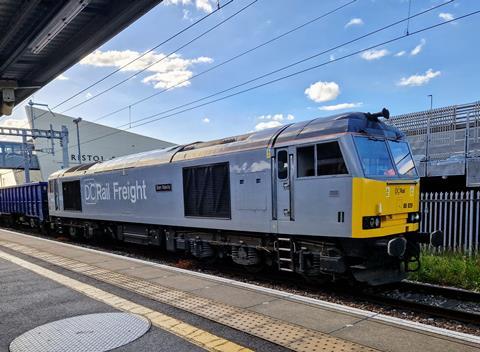
UK: A Class 60 diesel locomotive is to be converted to a modern form of steam power as a potential alternative to electrification for zero-emission heavy freight operations.
The Brush Traction loco dating from the early 1990s will be converted into a 2 MW steam locomotive by replacing its heavy diesel engine with a lighter system of 20 modular high pressure steam generators which burn hydrogen, along with four steam turbines and 140 kg of gas storage. Operation will produce no emissions, and it could use green hydrogen produced by electrolysis using renewable energy.
The project is named New Dawn, a nod to ‘Evening Star’, the last steam locomotive built for British Rail. It is being undertaken by scale-up company Steamology, which is also developing the technology for the industrial and marine sectors and previously supplied a 100 kW ‘range extender’ demonstrator for a Vivarail Class 230 multiple-unit.
Arup is providing engineering services, rolling stock leasing company Eversholt Rail supplying the locomotive and operator Freightliner contributing operating expertise. The project is backed by funding from Innovate UK.
Steamology said electrification is the most energy-efficient way to move freight on land, but with large parts of the rail network unelectrified, the use of green hydrogen could provide a ’complementary means of zero-emissions goods transportation by rail’.
On June 10 CEO Matt Candy told Rail Business UK that detailed design work for the project is now underway, with the conversion planned for 2025. Trials are an estimated 18 months to two years away, and main line certification could follow.
It is envisaged that if successful, the technology could be retrofitted to existing locomotives or incorporated into new-build designs.
Candy said the company’s steam technology is already operational at ‘full size and full scale’ in other sectors, and the rail project would demonstrate the viability of repowering heavy-duty transport assets which a long life. He said the technology is very energy dense, and could offer a better option than heavy batteries.
While the UK locomotive market is relatively small, he sees great potential in the US market.
Andrew Went, UKIMEA Rail Business & Global High Speed Rail Leader at Arup, said ‘decarbonised rail transport forms a key part of the infrastructure that we all need’, and the ‘cutting edge technology’ offers a potential way forward for heavy-haul freight which is ’the most challenging of rail modes to decarbonise’.
Freightliner Group CEO Tim Shoveller said ‘we are committed to supporting innovative R&D solutions which help to push the boundaries of rail as a core component of a sustainable infrastructure. Rail freight is already a greener option over road cutting carbon emissions by up to 76%.’
Eversholt Rail Client Services Director Paul Sutherland said the leasing company ‘has invested in many rail vehicle innovations and technology upgrades over the last 30 years’, adding that he was ’excited to see where this technology goes’.



